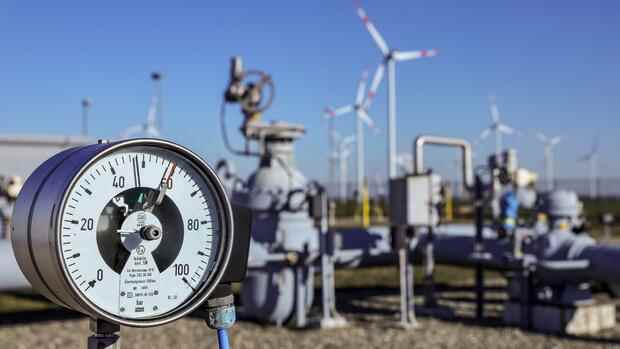A manometer shows the pressure in the natural gas network at the site of an underground gas storage facility. The suppliers fill the deposits under high pressure.
(Photo: dpa)
Dusseldorf The gas storage facilities in Germany are already half full again. On Sunday, the Gas Infrastructure Europe (GIE) association reported a filling level of 50.08 percent for Germany. On March 18, the stores were emptied down to 24.19 percent.
After the end of the heating period at the end of March, the German gas importers began to fill the underground and above-ground storage facilities with gas under high pressure because of the tensions with Russia in order to either stop Russian gas deliveries in the course of the Ukraine conflict or a boycott by the EU Commission arm. For comparison: Last year, the 50 percent mark was not exceeded until August 1st.
At that time, however, the storage tanks were only filling up slowly because the Russian Gazprom group only stored a small amount of gas in its storage facility in Rehden, Lower Saxony, and at the beginning of October the storage facilities were only about 70 percent full.
In 2020 it was 95 percent. This level should be reached again this year. And at the current pace, that should work. In the past few days, an average of just under 1100 gigawatt hours (GWh) per day has been stored. That should be enough to just about fill the capacity in German gas storage facilities of 230,000 GWh by the beginning of October.
Top jobs of the day
Find the best jobs now and
be notified by email.
The gas then stored would be enough to cover almost a quarter of Germany’s annual requirements. At the same time, the federal government and gas importers are trying to find alternatives to Russian gas – especially LNG, liquefied gas.
After the USA, Ukraine and Russia, Germany has the fourth largest gas storage capacity and a quarter of the EU capacity. Above-ground systems only make up a small part. Gas is mainly stored in natural deposits, for example in cavities in salt domes or in former gas and oil fields.
Germany needs Russian gas for storage
To ensure that the storage tanks are largely full at the beginning of the heating period, Germany is still dependent on gas supplies from Russia. Energy companies like Uniper and RWE can still keep the gas flowing. Recently there was concern because Russia insisted on payment in rubles, which could violate EU sanctions.
In the meantime, however, a mechanism has been found that apparently meets both requirements – those of Russia and those of the EU. European companies transfer money in euros to accounts at Russia’s Gazprombank. The bank converts this money from euros to rubles, and then transfers it to the actual business account.
Last week, Uniper and RWE announced that they paid their invoices due in May in this way. Uniper pays in euros in accordance with the new payment mechanism, acts in compliance with sanctions and can continue to guarantee timely fulfillment of contracts, a company spokesman confirmed. The procedure was agreed in advance with the federal government and follows the relevant EU guidelines.
More: After a dispute over ruble claims – Uniper and RWE have transferred their May gas bill to Russia

